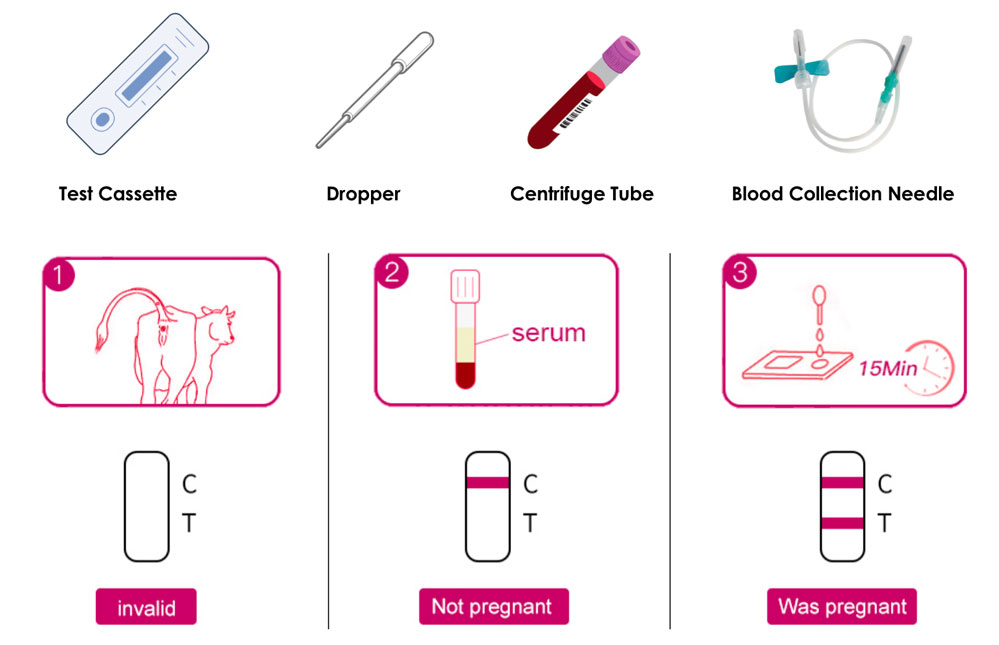Cow Pregnancy-associated glycoproteins (PAG) test
SEKBIO Company's PAG products are specialized test kit for animal reproduction management, especially for cow preagnancy testing. Our PAG products are accurate, simple, and reliable detection methods that can provide solutions for optimizing animal reproduction management and production planning.
The PAG product works by detecting the level of PAG in the animal's body to determine pregnancy. This method is non-invasive and has no adverse effects on animal health, making it safe to use. Using our PAG products can provide farmers with a simple, economical, and effective solution for animal reproduction management.
Our PAG products have advantages such as low cost, simple operation, and fast and reliable results, which can help farmers optimize animal reproduction management and improve farming efficiency. In addition, our PAG products can also be applied in the field of wildlife conservation, providing an essential tool for the protection of wild animals.
If you are interested in learning more about our PAG products or purchasing them, please contact us. We will provide first-class customer service and support to ensure you get the best product experience.
Product Name | Cat. No. | Note | Application |
PAGAB1 | mAb | LFA,ELISA | |
PAGAB2 | mAb | LFA,ELISA |
Aplication of Pregnancy-associated glycoproteins (PAG) Antibodies

PAG Test Kits: Common Questions and In-Depth Answers, Exploring the Secrets of Early Pregnancy Detection in cow
Q1: What is the principle (components) of cow early pregnancy testing?
A: Pregnancy-associated glycoproteins (PAG) are used as detection markers for early pregnancy testing in cow. These glycoproteins start appearing around 25 days after mating and can be detected in the blood. In the case of beef cattle, the components of these glycoproteins can even be detected after 28 days.
Q2: What is the accuracy rate?
A: The overall accuracy rate for testing starting at 28 days is 96%. Due to variations in the concentration of PAG in the early stages of pregnancy, some cows might secrete small amounts by day 28, It's recommended to delay testing until day 35, and its accuracy can reach 100% then. However, we claim 99% to ensure confidence, as we are able to achieve this level.
Q3: If not detected at 28 days, should we retest it?
A: If pregnancy is not detected at 28 days, a second test should be conducted after a week. This is due to the reasons mentioned earlier (in Question 2).
Q4: How does the color intensity of the test line change with pregnancy progression?
A: As the days of pregnancy increase, the intensity of the test line (T-line) in the test results will become darker. However, even if the T-line color on the test strip is faint, it can still be considered indicative of pregnancy.
Q 5: Can the test be performed on cows at a later stage of pregnancy?
A: Yes, the test can be performed on cows at later stages of pregnancy, but not after 40 days.
Q6: Can urine be used for the test?
A: Urine does not contain the pregnancy-associated glycoprotein marker. Therefore, using urine for the test is not accurate and not supported by evidence.
Q7: Can whole blood be tested?
A: Whole blood can be tested, but currently, we use serum for testing. We plan to transition to whole blood testing within the next six months due to technology update.
Q 8: Can blood be collected using a syringe?
A: The choice of blood collection method is not limited; any method that collects sufficient blood is acceptable.
Q9: Is tail blood collection necessary?
A: Blood collection is not limited to any specific location. Veterinarians often collect blood directly from the jugular vein in the neck, and some individuals might choose to collect blood from the ear. The key is to obtain sufficient blood.
Q10: What is the recommended blood collection volume?
A: It's generally recommended to collect a blood volume of no less than 1.5 milliliters. This aids in the stability of serum and makes serum extraction more convenient. Increasing the blood volume also aids in sedimentation for quick serum acquisition.
Q11: Is there a faster method?
A: Since blood needs to stand for at least 1-2 hours after collection, you can use a centrifuge after blood collection to quickly extract serum for rapid testing.
Q12: Does temperature affect the test?
A: The recommended storage temperature for test reagents is generally between 4°C and 30°C. The testing environment should not fall below 0°C or exceed 37°C. Extremely low temperatures affect sample flow, while high temperatures affect blood quality. Temperature also affects the settling of serum; the closer it is to body temperature, the shorter the settling time. At 37°C, it takes 1 hour; at 27°C, it takes 2 hours; and below 16°C, it takes even longer.
Q13: Can the test strips be used to test other animals?
A: No, each species has different indicators for pregnancy detection.
Q14: Can the test determine the month of pregnancy?
A: No, pregnancy-associated glycoproteins maintain high concentrations throughout pregnancy, allowing for accurate pregnancy determination. However, the exact conception time cannot be calculated.
Q15: When to choose early pregnancy test strips and ultrasound machines? (Recommendations)
A: Depending on the scale, choose between early pregnancy test strips or ultrasound machines for testing.
For small-scale breeders with fewer than 20 individuals, early pregnancy test strips are recommended. Blood can be collected during the morning feeding process, allowing blood to stand upright for testing later in the day.
For breeders with 50 or fewer individuals, early pregnancy test strips can be used with the option of using a centrifuge for quick serum extraction after blood collection for screening.
For breeders with 100-200 individuals, early pregnancy test strips can be used in conjunction with bovine ultrasound for cases where ultrasound doesn't show the fetus in the early stage (within 30 days) or in the late stage (over 6 months). This allows validation using early pregnancy test strips.
Our cow early pregnancy colloidal gold rapid test card provides an accurate method for detecting pregnancy-associated glycoproteins (PAG) in whole blood (EDTA), plasma (EDTA), or serum within 28 days after mating and throughout pregnancy. This testing method provides an important tool for veterinarians, dairy farms, and beef production facilities to detect pregnant cows. It helps to shorten cycles, increase breeding rates, and manage breeding costs.
Related Vet Diagnostics products
Product Name | Cat. No. | Note | Application |
Canine Pancreatic Lipase | S09-PL-4F9 | mAb | LFA,ELISA |
Canine Pancreatic Lipase | S09-PL-6C11 | mAb | LFA,ELISA |
Canine Relaxin | S09-Rx-2E12 | mAb | LFA,ELISA |
Canine Relaxin | S09-Rx-2F10 | mAb | LFA,ELISA |
Canine Hemoglobin | S09-HB-1A3 | mAb | LFA,ELISA |
Canine Hemoglobin | S09-HB-1H4 | mAb | LFA,ELISA |
Canine CRP | S09-CRP-10A9 | mAb | LFA,ELISA |
Canine CRP | S09-CRP-13H6 | mAb | LFA,ELISA |
Canine Parvovirus | S09-PV-7D5 | mAb | LFA,ELISA |
Canine Parvovirus | S09-PV-4C11 | mAb | LFA,ELISA |
Canine Distemper | S09-DV-6F5 | mAb | LFA,ELISA |
Canine Distemper | S09-DV-7E8 | mAb | LFA,ELISA |
Canine Coronovirus | S09-COV-14A5 | mAb | LFA,ELISA |
Canine Coronovirus | S09-COV-13H5 | mAb | LFA,ELISA |
Feline HerpesVirus | S09-FHV-1G6 | mAb | LFA,ELISA |
Feline HerpesVirus | S09-FHV-5B6 | mAb | LFA,ELISA |
Feline calicivirus | S09-CV-2A5 | mAb | LFA,ELISA |
Feline calicivirus | S09-CV-11A5 | mAb | LFA,ELISA |
African swine fever virus P72 | S09-ASFV-8B11 | mAb | LFA,ELISA |
African swine fever virus P72 | S09-ASFV-6E1 | mAb | LFA,ELISA |


















